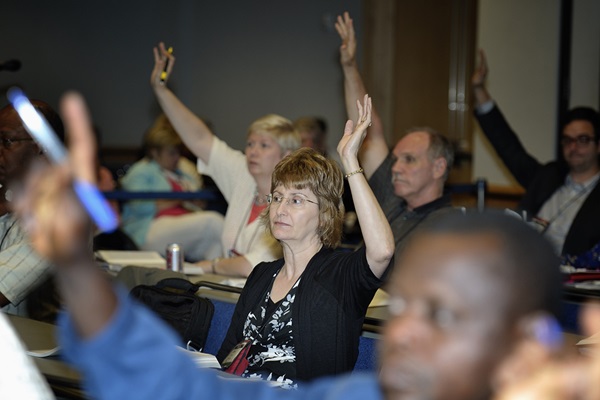In general, in The United Methodist Church, those who serve on a committee or board of a local church are elected or are members of those bodies because they hold another office (sometimes called ex officio members).
Only those elected and ex officio members have voice and vote when the committee meets. No one else has a right to vote. No one else can be granted a right to vote.
Those are the facts. Here are six common misconceptions.
1. Ex officio members have voice but cannot vote. That is what “ex officio” means.
Ex officio is a Latin term which means “on the basis of office.” It means the reason a person is on a committee is because of another office they hold. It says nothing about their ability to have voice or vote on the committee.
Ex officio members have voice and vote unless the Book of Discipline specifies that a particular ex officio member does not. One example is the treasurer. The treasurer is an ex officio member of the finance committee and the church council. However, if the treasurer is paid, the treasurer does not have vote on the finance committee. Since a paid treasurer does not have vote on the primary committee to which they report (finance), there is no vote on the church council either. Voice yes, vote no. But not because the treasurer is ex officio.
2. Since nearly all meetings of the local church are open, anyone attending the meetings has voice.
An open meeting means anyone may attend. That a meeting is open does not grant voice (the right to address the body) to anyone who is not an elected or ex officio member of the body. Those who are not members of the committee attend solely as observers.
The chairperson may, at their own discretion, grant voice to observers. Voice is generally granted for the specific purpose of addressing the body on a particular topic at a particular time. For example, if the finance committee is considering how to finance a capital need, it may ask an expert on fundraising to address them on possible options. However, being granted voice at one point in a meeting does not grant that person a right to address or even ask questions of the body on any other topic or at any other time.
3. The chairperson of a committee does not vote except to break a tie.
All chairpersons of all committees mandated in the Book of Discipline (church council, nominations, pastor-parish relations, trustees, and finance) are members in full of those committees. They have both voice and vote on all matters before the body they chair, just like every other member of the committee. The primary role of a chairperson is to facilitate the work of the committee. Being elected as a facilitator does not restrict voting privileges.
4. The pastor does not have vote on committees.
The pastor is the administrative officer of the church and, therefore, is an ex officio member of most committees of the local church. As an ex officio member of a committee, the pastor may vote on decisions before the body.
There are two exceptions - the pastor parish relations committee and the board of trustees.
The pastor parish relations committee is the personnel committee that works with the pastor and other staff. The committee’s role includes recommending compensation and benefits, conferring on ministry effectiveness, health and well-being and annually evaluating the pastor. The pastor meets with the committee, but cannot be a voting member.
The pastor meets with and participates in the discussions of the board of trustees, but the pastor is not a voting member unless specifically elected as a trustee.
The Book of Discipline provides no means for persons not participating during a meeting to vote. There is no provision for proxy voting in the Book of Discipline.
6. The term quorum always means at least half of the members of the committee are required to vote.
The term quorum refers to the number or percentage of people required for that body to conduct business and make decisions. The board of trustees is required to have at least half of its members participating in the meeting in order to conduct business. For every other body of the local church, the quorum is simply those members who attend the meeting.
Have any of these misconceptions have been shared in your congregation? Now that you know the facts, how will you help dispel them where you are?
This content was produced by Ask The UMC, a ministry of United Methodist Communications.





